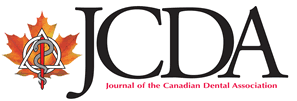 |
Current Issue | Subscriptions | ||||||
| Back Issues | Advertising | |||||||
| More Information | Classified Ads | |||||||
| For Authors | Continuing Education | |||||||
|
||||||||
 |
|
Extraction of Impacted Mandibular Third Molars: Postoperative Complications and Their Risk FactorsFULL TEXT
• François Blondeau, DMD, FRCD(C) • A b s t r a c t
Results: A total of 550 impacted mandibular third molars were extracted from327 patients (136 males and 191 females). The complication rate was 6.9%, consisting of 20 cases of alveolitis, 12 cases of infection and 6 cases of paresthesia of the inferior alveolar nerve. Of the 6 neurosensory deficits, 3 resolved and 3 were permanent. The risk factors associated with permanent neurosensory deficit were female sex, Pell and Gregory IC or IIC classification of impaction, and age greater than 24 years. The risk of postoperative alveolitis and infection was also greater among women. There was no significant relation between the use of oral contraceptives and alveolitis. Conclusions: Surgical removal of impacted mandibular third molars should be carried out well before the age of 24 years, especially for female patients. Older patients are at greater risk of postoperative complications and permanent sequelae. A surgeon's lack of experience could also be a major factor in the development of postoperative complications.
|
|
|
Full text provided in PDF format |
|
| Mission Statement & Editor's Message |
Multimedia Centre |
Readership Survey Contact the Editor | Français |
|